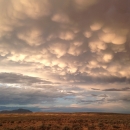Incorporating Genetic Structure and Diversity Into Restoration Guidelines for Sagebrush Ecosystems to Improve Resiliency and Restoration Success
Funding Year | Amount | Location |
FY24 | $80,000 | Rangewide |
Project Description
Restoration of the sagebrush sagebrush
The western United States’ sagebrush country encompasses over 175 million acres of public and private lands. The sagebrush landscape provides many benefits to our rural economies and communities, and it serves as crucial habitat for a diversity of wildlife, including the iconic greater sage-grouse and over 350 other species.
Learn more about sagebrush ecosystem requires knowledge of plants' adaptations to environmental conditions and patterns of genetic diversity and structure across species' ranges. While data on local adaptation for Artemisia tridentata taxa are available and integrated into a publicly available tool, data on diversity and structure have yet to be translated into user-friendly products. This project will rectify this knowledge gap by integrating maps into the Climate Smart Restoration Tool that can be used to inform management decisions concerning how to distribute sagebrush seeds throughout the landscape or where to collect seeds to support future restoration goals.
Partners
U.S. Geological Survey, U.S. Forest Service, University of Nevada, Reno, U.S. Fish and Wildlife Service – Ecological Services


